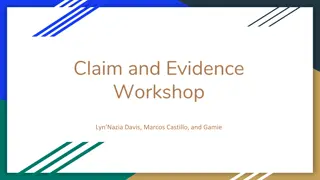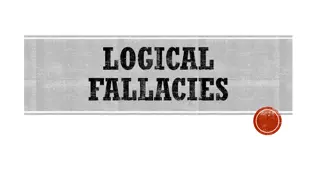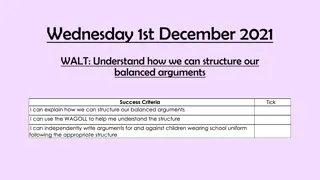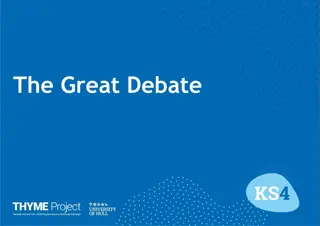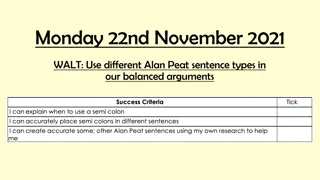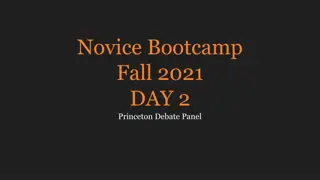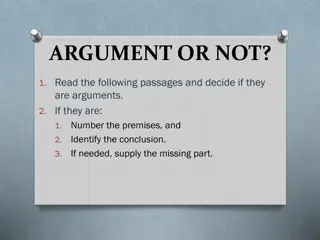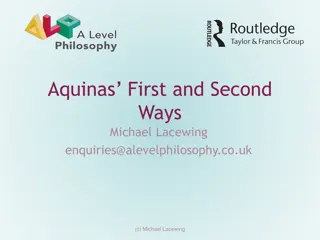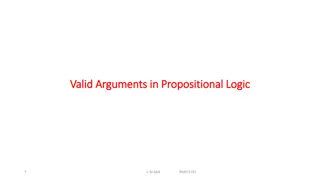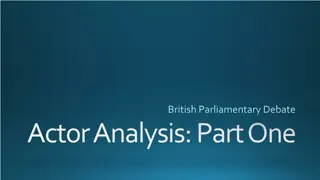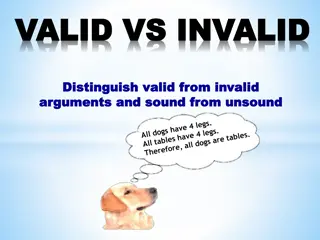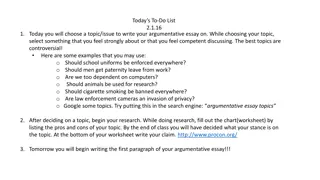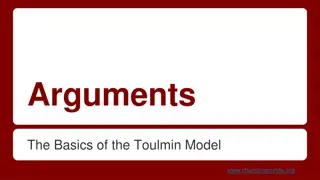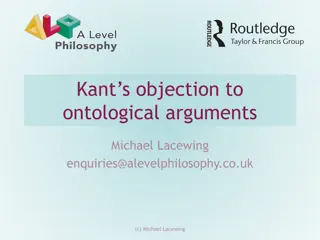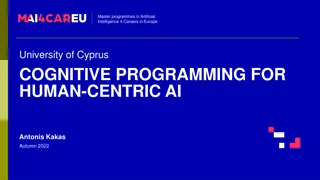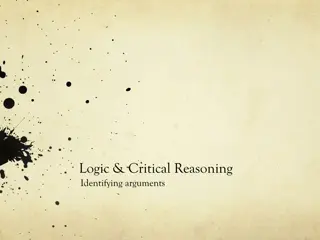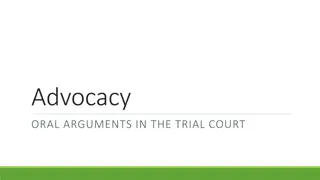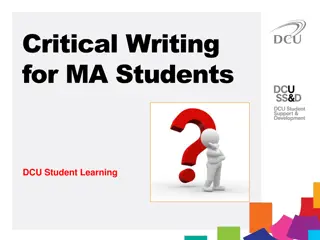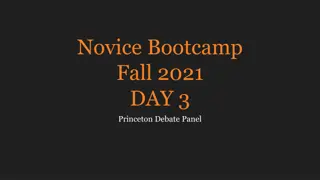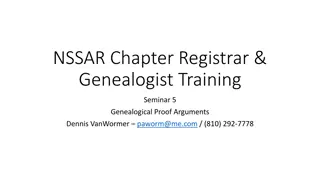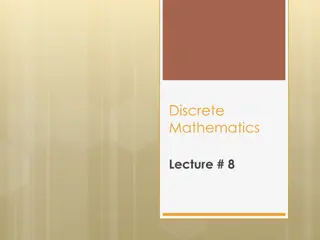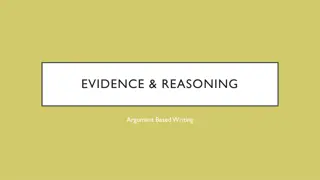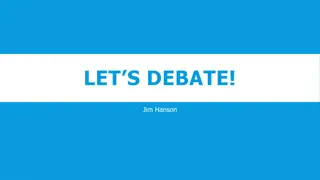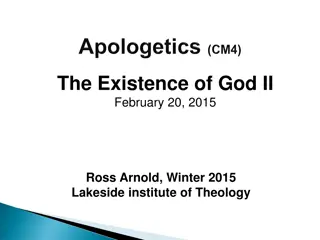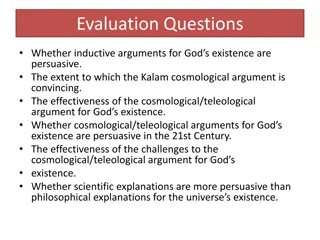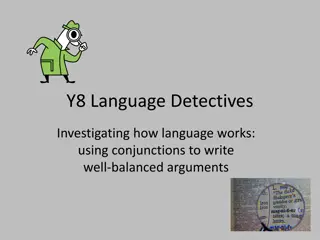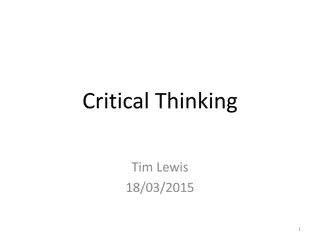Debate on Driving Skills: Are Women Better Drivers Than Men?
In this lesson students examine the debate on whether women make better drivers than men. The essay explores different perspectives, highlighting qualities such as patience and responsibility in women that may contribute to safer driving. Conversely, arguments against women drivers focus on perceive
2 views • 12 slides
Mastering the Toulmin Method for Constructing Persuasive Arguments
Learn how to effectively structure arguments using the Toulmin Method, which consists of Claim, Data, Warrant, Backing, Counterclaim, and Rebuttal elements. Explore reasoning and logic concepts, differentiate between inductive and deductive reasoning, and understand how to construct valid arguments
0 views • 30 slides
Identifying Logical Fallacies: Understanding Poor Reasoning
Logical fallacies are errors in reasoning that can occur in formal or informal arguments. Examples include appeals to authority, appeal to the majority, appeal to pity, and appeal to force. Understanding these fallacies can help in recognizing and avoiding flawed arguments.
0 views • 22 slides
Understanding the Structure of Balanced Arguments
Explore the concept of using the third person in writing balanced arguments to maintain objectivity and structure. Learn about third person pronouns and the importance of being unbiased in your writing. Understand the significance of structuring your arguments and maintaining a clear order for effec
0 views • 11 slides
The Great Bioeconomy Debate: Sustainability, Society, Environment, and Economy
Engage in a thought-provoking discussion on whether the bioeconomy can lead to a sustainable planet. Explore various viewpoints, prepare arguments using facts and opinions, and predict the future success of the bioeconomy. Collaborate as a team to link arguments, address Sustainable Development Goal
0 views • 14 slides
Mastering Quotations in Literary Analysis
Essays in the Literary Tradition sequence often require interpretive analysis arguments, built from articulate and defendable claims. This presentation by Dr. Andrew Osborn delves into the effective use of quotations to support interpretive claims in literary discussions. Learn how to incorporate em
1 views • 53 slides
Mastering Alan Peat's Balanced Arguments with Different Sentence Types
Explore the use of various Alan Peat sentence types in crafting balanced arguments, focusing on incorporating semi-colons effectively. Engage in interactive activities and practice sessions to enhance your skills in creating compelling arguments. Dive into examples and exercises to refine your under
2 views • 12 slides
Mastering Debate: Essential Strategies and Techniques
Learn key concepts like argument structure, points of clarification, and how to make compelling arguments in a debate setting. Discover the importance of warrants, impacts, and implications in formulating strong arguments. Explore tips on coming up with effective arguments and understanding differen
0 views • 47 slides
Effective Rebuttal Strategies in Debate
Rebuttal strategies like "delink," "terminal defense," and "topicality delinks" are discussed with examples on how to effectively counter opponents' arguments in debate settings. These tactics aim to point out flaws, falsehoods, or lack of relevance in the opponent's claims without directly disprovi
0 views • 10 slides
Mastering Final Focus in Debates
Final Focus, a crucial 2-minute speech at the end of a debate, serves as your last chance to persuade the judge of your victory. It involves comparing key voters and emphasizing the impact of your arguments. Weighing key voters is essential, with a focus on demonstrating why the scale tips in your f
1 views • 4 slides
Mastering Academic Writing: Moves that Matter in Response
In the academic writing realm, transitioning to the "I Say" stage can seem daunting, but it's crucial for building effective arguments. This stage focuses on three key ways to respond - agreeing, disagreeing, or sharing mixed opinions. It emphasizes the importance of clear and direct responses to en
2 views • 21 slides
Analyzing Arguments in Various Contexts
The provided content involves analyzing whether certain passages present arguments or not. It includes examples where premises lead to conclusions, such as the benefits of exercise and the moral implications of executive pay discrepancies. Each passage is evaluated to determine the existence of logi
0 views • 35 slides
Exploring Aquinas' Arguments for the Existence of God
Aquinas presents compelling arguments for the existence of God through the First and Second Ways, highlighting the necessity of a first cause and sustaining causes in the world. By delving into concepts of temporal and sustaining causes, Aquinas builds a philosophical framework that leads to the con
6 views • 16 slides
Understanding Reasonable Arguments vs. Pseudo-Arguments
The provided content focuses on distinguishing between reasonable arguments and pseudo-arguments through thought-provoking questions such as the ethical treatment of animals, city subsidies for sports venues, and subjective opinions on aesthetics. It also explains the structure of an argument, highl
0 views • 18 slides
Understanding Valid Arguments in Propositional Logic
An argument in propositional logic consists of premises leading to a conclusion. Valid arguments are those where the truth of the premises implies the truth of the conclusion. To determine validity, you can construct a truth table to check if the conclusion always holds when all premises are true. T
0 views • 9 slides
Understanding Actor Analysis in British Parliamentary Debates
This detailed analysis explores the concept of Actor Analysis in British Parliamentary debates, covering aspects such as preparation, in-round analysis, and weighing actor impacts. It emphasizes the importance of considering various factors including socio-economic status, minority groups, and histo
0 views • 10 slides
Understanding Valid and Invalid Arguments in Logic
In logic, arguments consist of premises supporting a conclusion, with deductive arguments claiming logical necessity. Valid arguments have premises implying the conclusion, making them deductively valid. For example, if all actors are robots and Tom Cruise is an actor, then logically Tom Cruise must
0 views • 25 slides
Crafting an Effective Argumentative Essay
Dive into the process of writing an argumentative essay by selecting a controversial topic, researching pros and cons, developing hooks for engaging introductions, and structuring body paragraphs with arguments, counter-arguments, and rebuttals. Stay tuned for crafting your introductory paragraph an
0 views • 13 slides
An Examination of Ontological Arguments for God's Necessary Existence
Various ontological arguments, such as Malcolm's and Anselm's, propose that the existence of God is logically necessary, grounded in the concept of God as the greatest possible being. These arguments challenge the coherence of the concept of God and counter objections, like Kant's claim that existen
2 views • 10 slides
Understanding the Toulmin Model for Effective Argumentation
The Toulmin Model provides a structured approach to crafting and evaluating arguments, consisting of key components like claims, grounds/data, and warrants. It emphasizes the importance of using evidence and reasoning to support claims effectively. By understanding this model, one can enhance the pe
0 views • 13 slides
Kant's Critique of Ontological Arguments
An exploration of Kant's objection to ontological arguments, examining the flaws in the reasoning of Anselm and Descartes. Kant argues that existence is not a predicate and does not enhance the concept of a being. Therefore, ontological arguments cannot prove the existence of God solely through conc
0 views • 7 slides
Understanding Argumentation and Realization in AI Master Programmes
Exploring the concept of argumentation and its realization in artificial intelligence master programmes, focusing on the construction, evaluation, and implementation of arguments through cognitive programming. The framework involves structured argumentation, conflict relations, and strength/preferen
1 views • 31 slides
Understanding Logic and Critical Reasoning: Identifying Arguments
In the study of logic and critical reasoning, identifying arguments is a fundamental task. Arguments consist of premises supporting a conclusion, and they can be identified by specific indicators and techniques. Understanding argument structure and types of support, such as deductive and inductive,
2 views • 15 slides
Guide to Oral Arguments in Trial Court
Learn how to conduct oral arguments in a trial court, including the steps for both the movant and respondent, strategies for making strong arguments, and tips for responding effectively. This comprehensive guide covers the dos and don'ts of oral arguments, emphasizing the importance of preparation,
0 views • 9 slides
Supporters of Slavery in the 19th Century: Legal, Religious, and Economic Arguments
In the 19th century, defenders of slavery utilized legal arguments by denying citizenship rights to blacks, religious arguments by justifying ownership and guidance through biblical references, and economic arguments by comparing treatment of slaves in the South to conditions of workers in the North
0 views • 4 slides
Understanding Command-line Arguments and Errors
Learn how to utilize command-line arguments in Python scripts to enhance flexibility and parametrize functions for various inputs. Explore ways to access and utilize command-line arguments effectively, while handling errors gracefully.
0 views • 30 slides
Mastering Critical Writing for MA Students: A Guide to Enhancing Academic Skills
Enhance your critical writing skills with this comprehensive guide tailored for MA students. Explore critical thinking, understanding arguments, critical reading, and effective writing techniques. Develop original ideas, create valid arguments, and engage in analysis to boost your academic performan
0 views • 20 slides
Enhancing Critical Thinking Skills for Undergraduate Students
Explore the essence of critical thinking, developing a questioning mindset, understanding arguments, and effective reading strategies for academic texts to excel in assignments. Embrace originality, valid arguments, and informed perspectives in your academic journey.
0 views • 14 slides
Mastering Rebuttal Strategies in Debate: A Comprehensive Guide
Discover effective rebuttal techniques in debate such as nitpicking, mitigation, and offensive rebuttals. Learn how to strategically undermine your opponent's arguments by challenging their burdens, reducing the impact of their points, and presenting counter-arguments that strengthen your position.
0 views • 23 slides
Analyzing Arguments in English Debates: A Critical Approach
Explore and critique various arguments presented in English debates, including topics like dietary recommendations, digestion issues with Japanese rice, and driving skills in different weather conditions. Learn how to evaluate evidence, causality, and persuasiveness in arguments to develop critical
0 views • 19 slides
Mastering Academic Writing Moves: The Art of Summarizing
In academic writing, mastering the art of summarizing is crucial for persuasive arguments. By engaging in dialogue with others and summarizing their arguments, writers can strengthen their position. It is important to strike a balance between the original author's ideas and your own, emphasizing asp
0 views • 15 slides
An Overview of Debate: Propositions, Teams, and Formats
Debate is a regulated discussion between two matched sides discussing a proposition, with the affirmative arguing for change and the negative defending the status quo. The standard debate format involves constructive arguments followed by rebuttals from both sides. The roles in a debate include the
0 views • 47 slides
Genealogical Proof Arguments and SAR Standard of Proof
This detailed content covers the definitions and components of genealogical proof arguments, proof summaries, and the SAR standard of proof. It explains the importance of evidence quality, source citations, and analysis in establishing acceptable genealogical conclusions for SAR membership applicati
0 views • 22 slides
Understanding Valid and Invalid Arguments in Discrete Mathematics
Concepts of valid and invalid arguments in discrete mathematics are explored through examples. Learn how to determine the validity of arguments based on premises and conclusions. Practice using truth tables to evaluate argument forms. Enhance your logical reasoning skills in Discrete Mathematics.
0 views • 22 slides
Effective Argumentation in Writing: Evidence and Reasoning
A comprehensive guide on utilizing evidence and reasoning in argument-based writing. Learn how to incorporate facts, quotes, and statistics from reliable sources to support claims, and how to analyze and explain the evidence to strengthen your arguments. Examples illustrate the importance of evidenc
0 views • 5 slides
Mastering Debate Techniques for Effective Judging and Participation
Enhance your debate skills by following a structured approach that includes preparation steps, active listening during debates, and providing constructive feedback as a peer judge. Learn how to evaluate arguments, identify strengths, and suggest improvements for debaters. Practice decision-making ba
0 views • 29 slides
Philosophical Apologetics: Arguments for the Existence of God
Philosophical apologetics presents various arguments for the existence of God, including the ontological, cosmological, teleological, moral, transcendental, and presuppositional arguments. These arguments cover diverse aspects such as change, causality, design, contingency, miracles, consciousness,
0 views • 10 slides
Evaluating Arguments for God's Existence in the 21st Century
Exploring the persuasiveness of inductive arguments for God's existence, assessing the Kalam cosmological argument, and evaluating the effectiveness of cosmological/teleological arguments. Delving into whether scientific explanations surpass philosophical ones, the strengths and weaknesses of these
0 views • 16 slides
Mastering the Art of Writing Persuasive Arguments with Conjunctions
Dive into the effective use of conjunctions to craft well-balanced arguments through engaging dialogues, examples, and strategies. Explore how contrasting ideas can be skillfully presented to strengthen your argumentative writing in various scenarios, from educational debates to environmental discus
0 views • 10 slides
Understanding Critical Thinking, Hypotheses, and Arguments
Explore the concepts of critical thinking, hypotheses, and arguments in this informative content. Learn about the definition of hypotheses, the nature of arguments, and syllogisms. Delve into the world of logical reasoning and the foundations of thought processes.
0 views • 32 slides

